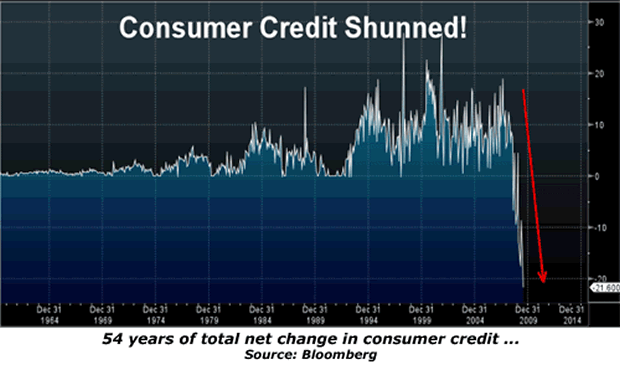Governments Competing to Keep Their Currencies Weak
Currencies / Fiat Currency Sep 12, 2009 - 11:37 AM GMTBy: Bryan_Rich
 Many governments are warning about the risks that may undermine economic recovery. And a lot of that concern is surrounding the value of their currency.
Many governments are warning about the risks that may undermine economic recovery. And a lot of that concern is surrounding the value of their currency.
Since March, most currencies have risen sharply against the U.S. dollar. As investor appetite for risk has progressively improved, there has been less demand for the safe haven value of holding dollars and more demand for higher risk/higher return foreign currency denominated investments.
This bounce-back in currencies was a welcome sign at first because it was a testament to improving sentiment and outlook for the prospects of recovery. But too much of a good thing can turn into a bad thing.
And that’s especially true for countries that are heavily dependent upon exporting. A stronger currency makes their products more expensive to foreign buyers. The additional hurdle of a rising currency combined with an already weak global demand environment can deliver a crushing blow to a fragile economy.
That’s what government officials are concerned about. And that’s why speculation of official intervention in the currency markets is becoming a hot topic.
Mounting Talk of Intervention
Since March, the Swiss franc has climbed 13 percent, the Canadian dollar has risen 18 percent, the Brazilian real has jumped 32 percent, the Australian dollar has soared 35 percent and the New Zealand dollar has vaulted 41 percent.
A rapid move in a currency is a trigger for intervention speculation. That’s because it gets to the heart of why governments intervene. They believe that the value of their currency on a relative basis becomes inconsistent with economic fundamentals. And that can become a threat to competitiveness.
And that’s what we’re seeing now.
 |
| Since March, most currencies have risen sharply against the U.S. dollar — triggering talk of intervention. |
The Reserve Bank of New Zealand describes the recent strength of the New Zealand dollar as an “indiscriminate rush back into risk-taking” and says the rise in its currency is “larger than can be justified on the basis of developments in the outlook for the New Zealand economy.”
The Bank of Canada and the Canadian Finance minister have said that a stronger Canadian dollar was a major risk to economic growth. And the Canadian finance minister has signaled that steps might be taken to dampen the volatility in their currency.
And the Swiss National Bank is well beyond verbal threats. They’ve already stepped in to push the value of the Swiss franc lower on two occasions this year — selling Swiss francs and buying euros and U.S. dollars. This is after going nearly 17 years without independently intervening in the global currency markets.
All of these efforts, whether verbal or actual intervention, are attempts to reverse the tide of currencies. Or at minimum, slow the pace.
Why? Because …
Export Economies Need a Weak Currency
While export-driven economies enjoyed prosperity in the global credit boom, those economies also became more and more one-dimensional. The U.S. became more engrossed in consumption and content with importing final goods rather than producing them. And the rest of the world noticed the hyperbolic growth they could achieve by ramping up capacity to export more and more goods.
But within this budding government-manufactured recovery taking place around the globe, there is little evidence that structural adjustments are being made to bridge government-led growth to a sufficiently robust and sustainable private-led growth. In fact, there’s a reliance on the same liquidity game and export dependent economic models that created the whole mess. That’s why strengthening currencies are being fought by these economies that are hoping to export their way to recovery.
 |
| Export-driven economies enjoyed prosperity in the global credit boom, but are now facing new challenges as the U.S. consumer saves more and spends less. |
But There Is a Critical Missing Ingredient …
The U.S. consumer has retrenched. And this is where the problem lies — and where the next phase of this crisis will likely come to roost. The U.S. consumer is repairing his balance sheet — saving more, spending less.
The easy credit days that induced the consumption boom from U.S. consumers has dried up. In fact, the scarce credit that is available is, by and large, being shunned by the consumer. It’s clear that consumer attitudes have been damaged. And it’s glaringly evident in the credit report released by the Fed this week.
While the extent of this fall in credit was largely ignored by the media, take a look at this chart to see from a historical perspective just how dramatic this drop really is …

Bottom line: Considering the fragile nature of economies, the rapid rise in currencies over the past six months could easily derail recovery, weak or strong, before it ever materializes for many export centric economies. And the significance of this threat creates an environment where currency intervention becomes an increasingly probable scenario.
Regards,
Bryan
This investment news is brought to you by Money and Markets . Money and Markets is a free daily investment newsletter from Martin D. Weiss and Weiss Research analysts offering the latest investing news and financial insights for the stock market, including tips and advice on investing in gold, energy and oil. Dr. Weiss is a leader in the fields of investing, interest rates, financial safety and economic forecasting. To view archives or subscribe, visit http://www.moneyandmarkets.com .
Money and Markets Archive |
© 2005-2022 http://www.MarketOracle.co.uk - The Market Oracle is a FREE Daily Financial Markets Analysis & Forecasting online publication.



